 Let me tell you a tale of two cafes. It begins here in the Good Hood, a traditional Japanese neighborhood in Himeji city, western Japan, and my home away from Australia for 14 years. Past the Funabiki Barber Shop, the Narusei tea seller, the bicycle mechanic, the yakitori grill, a little further on from the liquor store and the rice miller, there stands a small building with smoke-stained windows and a faded sign that reads “Ginza Tearooms.” An ode to this place might go something like this: “You’re better off in a tea room in Ginza than in the Ginza Tearooms….” It is hands down the filthiest cafe this side of Tokyo Tower--a place where brewed means stewed and dust rises in dunes under the tables. The air hasn’t been changed since the Showa Period. Now I’ve had coffee in some pretty stuffy joints, but this place, the ‘Ginz’ I’ll call it, is more pinched than a Bangkok bus driver’s underpants. And I wondered, I wondered why, after 14 years, had I not noticed this tiny, forgettable place in the shadows at the end of our traditional shopping street. Curiosity almost killed me. I took a seat by the window last Tuesday, ordered, and opened my book of Roald Dahl short stories and started a tale about a sinister hotel madam who lures a young man to a gruesome end. Behind me dice rolled over a greasy tabletop, a man chuckled; ahead of me, a local ancient tapped a hard-boiled egg. Endlessly. My Japanese Java arrived. The matron slid a plate of toast in beside it and backed off slowly. I looked at my book, I looked back at her. Was it me or the toast? Moldy toast! The egg that came with it had been boiled when the last samurai walked these streets. The coffee was bitumen black….one sip, two sips. My tonsils were tarnished. My bowels clanging. I quickstepped across the linoleum to the small room, pressed the grimy light switch and assumed the position that a traditional Japanese toilet demands. With no lock on the door I risked being the main act for the breakfast crowd. Not that they would have known: all heads were lost to a cigarette haze. After washing my hands, I washed them again. I found an unused corner of a grubby towel, wiped my hands, paid my bill and fled. My time at the Ginz was served. I was free to breath the late summer air and marvel at the beautiful blue sky once again. And that is the story of a cafe I know. (Yeah, yeah, I know I said a tale of TWO cafes but I’m over the word limit for this week.) Next week: The Good Hood’s Caffeine High.
1 Comment
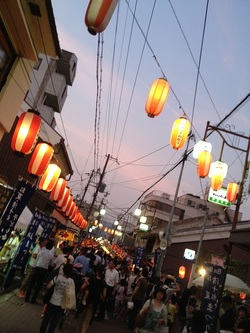 Festival fever beats cabin fever Festival fever beats cabin fever Beebedy-beep-beep. Tonight’s air traffic over Japan will be heavier than usual. Across the archipelago, over city, town and paddy, spirits of all ancestors will return en masse to the spirit world. Obon has been a blast (for them). Three days of lurking and lingering in incense-filled rooms, with the pinging and bonging of altar chimes and the hum and drone of the visiting Buddhist priest’s sutras to venerate their retired souls. In addition, the living must leave their cool, dark homes and venture out under a blistering August sun to pay further homage. This means, for my old friend Ono-san and my old kitchen gardener mate Smokin’ Joe Matsumoto, a trip to the cemetery. City of the Dead, Spirit Suburbia, Hallowed Heights--call it what you will, but here in Himeji city, Ono-san, Matsumoto-san and half a million more, know it as Nagoyama: an entire hillside combed by long, neat rows of gravestones which rise to a Buddhist stupa at the summit. From here I would like to say that ‘on a clear day you can see forever’ but the mills of Nippon Steel on coast cause me to swallow my words. Small paper lanterns are lit and placed at the graves on the first day of Obon to ‘guide’ the spirits in--much like the runway lights of Kansai International Airport. Gravestones are then wetted and cooled with ladles of water and rubbed off, their chrysanthemums changed, offerings made, candles lighted, incense burned and prayers murmured. Occasionally a hard-up drifter might take liberties with the offerings of fruit, snacks and cans of beer and sake, there’s no law against it, but you won’t catch me peeling hot oranges and drinking boiling beer. Obon is a strangely eerie time. Cicadas fall out of the sky dead, crisp as beer snacks, the streets and alleys of the Good Hood, my home for 14 years, are suddenly lifeless, dreary even. Thankfully, Obon is sandwiched by vibrant summer festivals--in the weeks before and after, fireworks turn the nights into day and Himeji’s neighborhood streets fill with stalls and parades of dancing women in yukatas. And the Good Hood, despite its slow decline, partakes. Woo-hooo! Lanterns are hoisted high on the shopping street, yakitori and cotton candy stalls materialise and the courtyard of Keiunji Buddhist temple glows with candles and the cheeks of old shakuhachi flute players who have drunken too much beer. Children appear in yukata, followed by parents and hobbling parents’ parents, all eager to sample the night’s delights; for the kids, that’s mountains of coloured ice and for parents, an icy beer will do nicely. Obon also means the return to hometowns of old school friends, which in turn means you will be hard-pressed to get a table at any of the city’s rooftop beer gardens around this time because of all the sodden reunioning. Seaside Japan empties too after Obon; kids suddenly remember the mountains of summer holiday homework they haven’t touched, while company workers trudge drearily off to catch a bus to somewhere they’d rather forget, dreaming instead of the past week’s seafood feasts, bikini girls and white caps of the Japan Sea or Pacific Ocean. And just like that, summer is gone, slipped through our fingers. Melted away like a wily spirit. Next week: Where can you get a good cup of coffee in a land famous for tea? Why, the Good Hood of course! 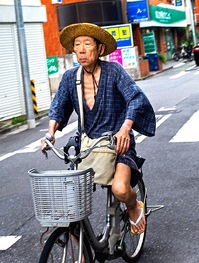 Photo: tokyojournal.org Photo: tokyojournal.org “Can you ride a bicycle?” must be the dumbest question anyone could ask a citizen of Himeji city, western Japan. “You ridin?” Warmer. “Did you grease today?” Now you’re learning. See, in my city, two wheels are king. Citizen Rider rules. In fact, you could say the place runs on rice, takuan and two wheels. The lay of the land encourages it. Save for a few small mounds (which people call mountains), Himeji is as flat as a teppanyaki grill, with narrow streets cut with alleyways and a vast underground parking lot manned by cheery old men in powder blue vests. True, the family car is an extension of the family home in Japan. Yet no citizen will deny that cycling is cleaner, cheaper and faster in rush hour AND, when the sun goes down, can be used under the influence of alcohol (but don’t quote me on that). Citizen Rider is vaguely aware of the road rules, like some nagging little detail they once learned but can’t quite remember. So to all of YOU reading this and contemplating a visit to this great city, I say “When in Rome...” forget the helmet, ride on the sidewalk, the wrong side of the road even, do it while smoking, talking on a cell phone, holding an umbrella, with a case of beer in your front basket and your date on the back. Seriously though, what makes the bicycle the proletariat’s choice is its versatility. It is packhorse, child carrier, people mover and treadmill to the half million of Himeji city. 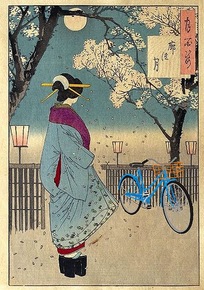 In the Good Hood, north of Himeji Castle and my home for the past 14 years, people are not so much upwardly mobile as they are simply ‘mobile.’ Outside my door runs a street that should be called the Hood Chi Minh Trail for the amount of two-wheeled traffic it serves. Along this narrow stretch of blacktop comes and goes a host of familiar faces: the orange-haired kid with the pop singer’s voice, the dawn-riding opera singer (an elderly Puccini fan), the three complaining housewives (always three abreast), the chuckling kitchen gardeners who waft onions, the Funabiki Barber boys with their coconut haircuts, and the list rolls on. Oh yeah, and then there’s me, the token foreigner on a peach-coloured ladies’ bicycle named “Sweet Libs”. This classic beauty is on extended loan from a friend of mine. So each time the cops pull me over for a random check of the serial number, I have to unwind a story so long their eyes glaze over like mackerel in a fish market. They quietly slip away, nodding politely. Can’t blame them. For pulling me over, that is. You see, years ago, the city was besieged by a gang of bicycle thieves. That was the summer of ‘99 and I lost three bicycles--and one the following year--to sticky fingers. Word on the street was that the hot bikes were being shipped to hot countries in the southeast and even North Korea. A police crackdown choked their operation, but to this day I still wonder if some radish farmer north of the DMZ isn’t whistling happily home on a set of wheels that once turned to my rhythm. There are half a million people in Himeji city. Almost everyone has a bicycle. Unfortunately not everyone loves their bicycle, and here and there you find them, abandoned, saddleless, half-submerged in the silt of Semba River or the Himeji Castle moat, or stripped to their frame in some vacant lot. How could you not love a bicycle that goes by the name “Fat Cat”, or “Ferrari”, or “Fromage”, or “Vincent”, or “Mimolett,” and my personal favourite, “Eleanor.” Next week: The Good Hood erupts with summer festival fever. Stay tooned. As Himeji simmers into August there is only one expression you need to know:
“Atsui-naaaa!” No other country to my knowledge substitutes “Good morning” with “Geez it’s hot!” But as temperatures soar and humidity threatens to collapse the atmosphere, these two hyphenated words are all you need to carry a conversation in the Good Hood, my home for the past 14 years. It might go something like this: Atsui-naaa! = Hotter than hell isn’t it! Atsui-na? = Me? Oh I’m surviving. Atsui-na... = Only just... Atsui-na? = Matsui-san’s dog died, didn’t you hear? Atsui-na. = Heatstroke. Atsui-na... = Cremation’s tomorrow... Atsui-na? = Going? Naaa = Nah. Atsui! atsui! = Hear it’ll be hotter than hell. But to the meat of the matter: Summer is for swimming. And just where does one go to cool off in the Good Hood? Well, there’s the Semba River; its waters run swift, cool and teem with life, though not the human kind, for the reason that dozens of neighborhoods lie between its source in the mountains and my house, and the ‘northerners’ tend to muddy the waters for us ‘downstreamers.’ I try to visualise my neighborhood as it stood 50 years ago. My old friend, Ono-san, helps me: she says it was “a lush blanket of rice fields with a river running through it” and shaded by camphor trees where she could swim after school. Nice. But last year a government-funded construction scheme erected a wall along the river’s banks, all but snuffing out that memory. “The neighborhood’s steaming,” howls Ono-san. So these days hot heads and hot bodies are cooled in inflatable pools; huge pink and lavender-coloured things into which pile the kids, and the kids from next door and the friends and cousins of these kids, until Archimedes water displacement theory is enacted and all water flows out and down the street. Returning to the sea from whence it came. So with the river sealed off, the pink inflatables stretched to their limits and the Seto Inland Sea only a vague whiff of salt on the humid air, what to do? What to do? The Shimin Pool, of course! “Shimin” (“Citizens” in Japanese) and “swimmin” are interchangeable words. Coupled with “pool” they both stand for the same thing. Like the watering holes of the Serengeti, the Shimin Pool is where the herds of Himeji city migrate on hot afternoons. By 2pm every patch of wet concrete has been paved over with picnic sheets or shade tents and the pools--a wave pool, current pool, water slide and super warm toddlers’ pool--have become large pots of bobbing, sunburned citizens. By day’s end, when the human tides have receded and the distant thunderheads loom high, dragonflies come down from the nearby mountain to drink at the pools’ edge. This is the best time of day. I don’t see too many of my elderly neighbors at the Shimin Pool. “Too noisy, too crowded!” says Smokin’ Joe Matsumoto, the old kitchener gardener who lives up my street. Privately though, I think he still feels some nostalgia for the public pools; it’s where many of the city’s old timers came of age during their summer holidays, so long ago. Next week: The Good Hood by bicycle! |
This Blog:What is the essence of a traditional Japanese neighbourhood? Writing from my home in Himeji, a castle town in western Honshu, Seaweed Salad Days distills, ferments, presents! Archives
March 2024
Categories
All
|
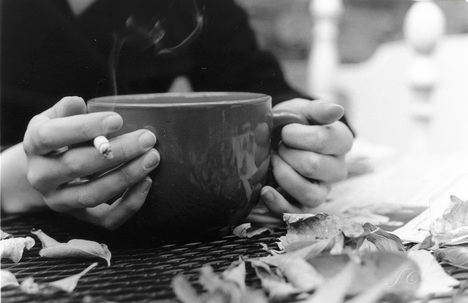
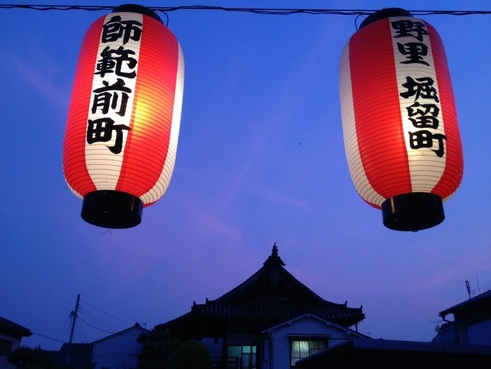
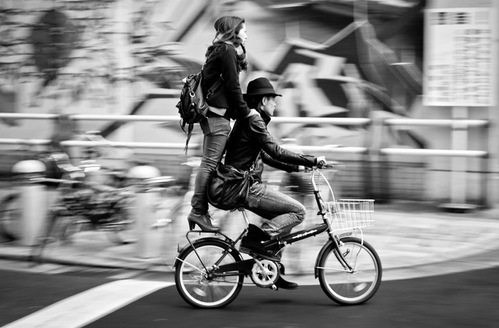
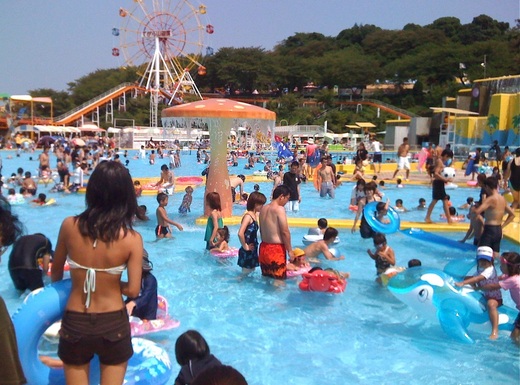
 RSS Feed
RSS Feed
